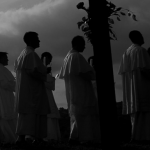I am twenty-three years old, and I am spending my summer taking Intermediate Latin at Notre Dame. I’m not even doing it for credit; officially, I’ve fulfilled my Master’s program’s ancient language requirements, having already taken Latin I and II. I question my decision at times, especially when I am sitting on my back porch in the summer evenings, covered in a blanket of crumpled notes on participles and infinitives and deponent verbs and semi-deponent verbs, attempting to translate Cicero’s second Oration against Cataline.
So what is it that keeps me in Hesburgh library? Why do I care, really, about passive periphrastics and ablative absolutes and ablatives-of-time-within-which?
I am reminded of an essay that was recently passed along to me by a friend. It was written by Simone Weil in 1942 and is entitled, “Reflections on the Right Use of School Studies with a View to the Love of God.” In the essay, Weil writes that, “the key to a Christian conception of studies is the realization that prayer consists of attention. It is the orientation of all the attention of which the soul is capable toward God.”
Having established this fundamental assumption, Weil goes on to argue that school exercises, while of course developing a lower kind of attention, are nonetheless very effective in increasing one’s general power of attention. When studies are seen in this light, as an exercise of concentration, whether we fail or succeed in these studies – whether our Latin translations of Cicero which we have slaved over for hours are riddled with mistakes, to take a totally random example – ceases to matter very much. “If at the end of an hour,” writes Weil, “we are no nearer to [solving a problem of geometry] than we were at the beginning, we have nevertheless been making progress each minute of that hour in another more mysterious dimension. Without our knowing or feeling it, this apparently barren effort has brought more light into the soul.” Even if we cannot see the fruits of these seemingly wasted hours, Weil assures us that isn’t for naught.
What’s more, she argues, the mistakes that we make in our academic studies teach us the virtue of humility. We are often tempted, upon receiving a poor grade on a test or an essay, to shove it in the very back of our notebook, where it will likely – and happily – never be seen again, or at least not for a very, very long time. And this is precisely what we shouldn’t do. Weil tells us to “take great pains to examine squarely and to contemplate attentively and slowly each school task in which we have failed, seeing how unpleasing and second-rate it is…trying to get down to the origin of each fault”, without making excuses for ourselves.
True attention is difficult: “There is something in our souls which has a far more violent repugnance for true attention than the flesh has for bodily fatigue.” I, for one, can attest to that. It is likely the reason why I suddenly become just so curious about the contents of my refrigerator every time I try to do my Latin assignments at home. “Attention consists of suspending our thought, leaving it detached, empty and ready to be penetrated by the object” — it becomes a kind of waiting upon truth. Sometimes we must wait a long time. But perhaps this kind of attentive waiting can teach us to better listen to God’s voice.
Finally, Weil writes, “Not only does the love of God have attention for its substance; the love of our neighbor, which we know to be the same love, is made of this same substance.” She writes that the capacity to give one’s attention to a sufferer is nothing short of a miracle. It is the ability to look at our neighbor in a very particular way— a way that does not come naturally to us. And it is a way that is first of all attentive. “The soul empties itself of all its own contents in order to receive into itself the being it is looking at, just as he is, in all his truth.”
There might just be something to translating Cicero in July.
[Image of Student Studying from Wikipedia]













